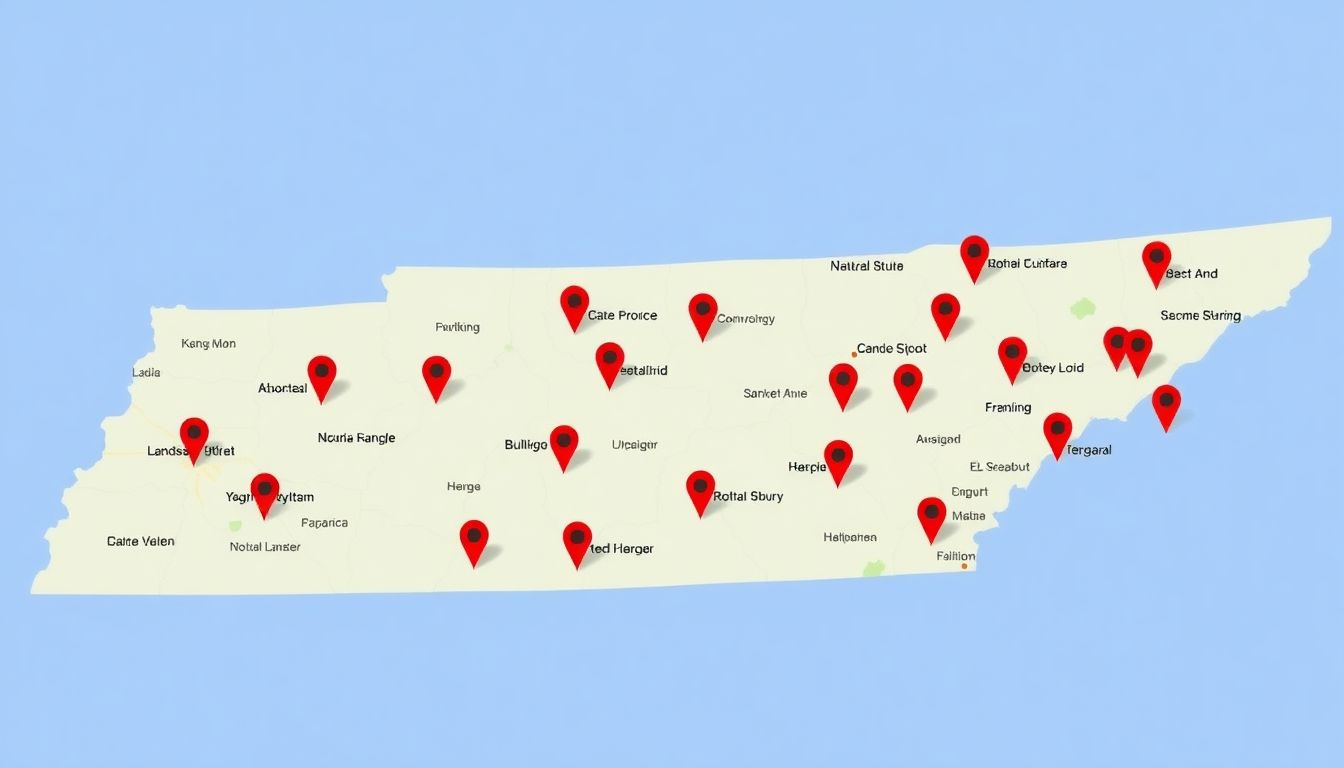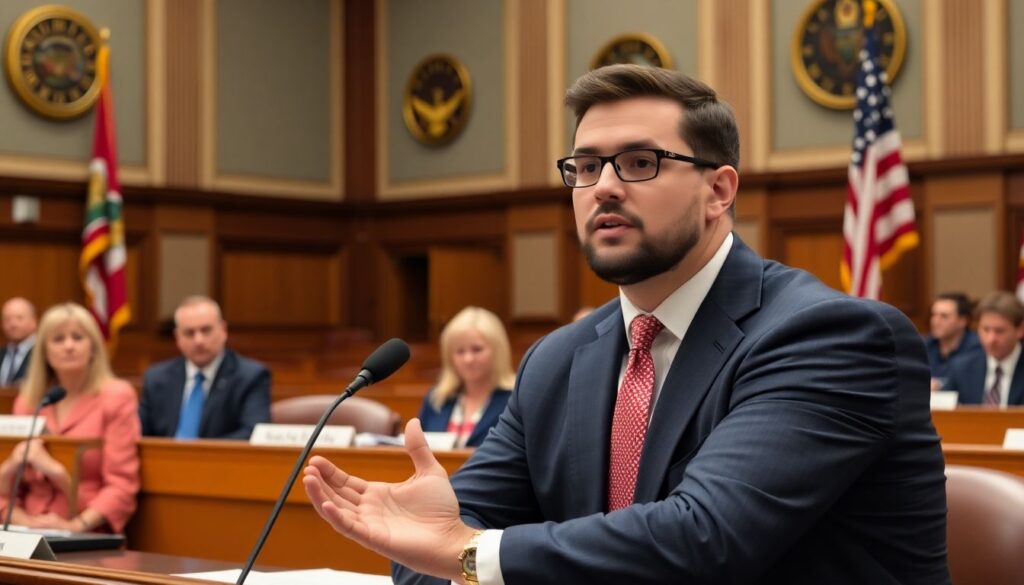As the year draws to a close and a new legislative session looms, Tennessee lawmakers are gearing up to address the aftermath of Hurricane Helene. Republican State Rep. Jeremy Faison is spearheading an initiative to provide tax relief to homeowners affected by natural disasters, aiming to ease the financial burden during their recovery.
State Rep. Jeremy Faison leads the charge to provide tax relief for natural disaster victims.
In the grand legislative hall, the air is filled with a mix of solemnity and anticipation. The room, adorned with the state’s flags and official seals, bears witness to the gravity of the discussions held within its walls. State Representative Jeremy Faison stands tall at the podium, his eyes scanning the rows of seated colleagues, each one a mix of serious expressions and hopeful gazes.
Faison’s voice resonates through the chamber, commanding yet compassionate. He speaks of the proposed tax break for disaster survivors, not just as a political initiative, but as a lifeline for those who have seen their homes and livelihoods swept away by nature’s wrath. His words paint a picture of resilience, of neighbors helping neighbors, and of a state that does not turn its back on its people in their time of need.
As he speaks, the room is silent save for the occasional murmur of agreement or the rustle of papers. The weight of their responsibility is palpable. Yet, there is an undercurrent of hope, a shared desire to make a difference, to ensure that when disaster strikes, their constituents know they are not alone, that their state will stand by them, ready to help them rebuild and rise again.

The Impact of Hurricane Helene
In the annals of Tennessee’s weather history, few events have left an impact as indelible as Hurricane Helene. Sweeping through the state with unmitigated fury, Helene brought with it torrential downpours that quickly overwhelmed rivers and streams, leading to catastrophic flooding that crippled communities and left a trail of devastation in its wake.
One of the hardest-hit areas was Cocke County, a region nestled in the eastern part of the state. The county’s topography, characterized by steep mountains and narrow valleys, created a funneling effect that exacerbated the flooding. Rivers like the French Broad and Pigeon swelled to unprecedented levels, inundating homes, businesses, and critical infrastructure. Residents watched in horror as roads turned into raging torrents, sweeping away vehicles and cutting off entire neighborhoods. The sheer volume of water was staggering; long-time residents recalled never having witnessed such a deluge.
The broader impact of Hurricane Helene across Tennessee was no less devastating. Major interstates and highways were submerged, paralyzing transportation and leaving thousands stranded. In cities like Nashville and Knoxville, floodwaters surged through downtown areas, forcing evacuations and causing millions of dollars in damage. The state’s agricultural sector also took a significant hit, with crops destroyed and livestock lost. The economic toll was immense, affecting not just the immediate recovery efforts but also the long-term viability of local economies.
Beyond the physical destruction, the emotional toll on communities was profound. Lives were upended, and the sense of security that many had taken for granted was shattered. Yet, amid the chaos, stories of resilience and community spirit emerged. Neighbors helped neighbors, and volunteers from across the state and beyond poured in to assist with cleanup and recovery efforts. It was a testament to the enduring spirit of Tennesseans, who, even in the face of such overwhelming adversity, came together to rebuild and heal. The legacy of Hurricane Helene serves as a stark reminder of nature’s power and the importance of preparedness and community support in the face of such events.

Proposed Tax Break Legislation
In a move that has sparked both debate and anticipation, State Rep. Jeremy Faison has proposed legislation aimed at providing tangible tax relief to Tennessee residents. The need for such a measure, Faison argues, is rooted in the current economic climate where the burden on taxpayers has become increasingly onerous. With the cost of living on the rise and wages often failing to keep pace, many Tennesseans are feeling the pinch. The proposed tax relief is designed to ease this financial strain, putting more money back into the pockets of hardworking individuals and families. Faison’s plan isn’t just about economics; it’s about fostering a sense of financial security and well-being among the state’s residents.
The proposed legislation, however, faces significant challenges. Amending current laws is a complex process that involves navigating a labyrinth of legal and political hurdles. One of the primary obstacles is the state constitution itself, which sets forth stringent guidelines for taxation and revenue allocation. To achieve meaningful tax relief, Faison and his allies must craft a bill that not only addresses the immediate needs of taxpayers but also aligns with the constitutional framework. This balancing act requires meticulous drafting and a deep understanding of both the legal landscape and the practical implications of the proposed changes.
Among the key challenges are:
- Ensuring the legislation does not inadvertently create new fiscal burdens for the state.
- Addressing potential opposition from those who benefit from the current tax structure.
- Building a coalition of support among fellow legislators who may have differing priorities.
Despite these challenges, Faison remains optimistic. He believes that by fostering open dialogue and collaboration, a path forward can be found. The proposed legislation is not just a financial measure; it’s a statement of commitment to the people of Tennessee. It’s a promise to work towards a future where the tax system is fairer, more transparent, and more supportive of those who need it most. As the debate unfolds, all eyes will be on the state legislature to see if Faison’s vision for tax relief can become a reality.

Statewide Significance
The recently passed legislation is a beacon of hope not just for East Tennessee, but for the entire state. While it was initially prompted by the devastating floods that swept through East Tennessee, the significance of this legislation extends far beyond the borders of this region. It represents a proactive step towards addressing a statewide issue: the increasing frequency and intensity of severe weather events.
This legislation is a comprehensive response to the challenges posed by natural disasters. It includes provisions for:
- Improved early warning systems
- Infrastructure upgrades to enhance resilience
- Increased funding for emergency response teams
- Support for communities in recovery and rebuilding efforts
The importance of this legislation is underscored by the recent tornadoes that tore through West Tennessee. These events highlighted the urgent need for better preparedness and response mechanisms across the state. By addressing these needs, the legislation ensures that Tennessee is better equipped to handle future disasters, regardless of where they strike.
Moreover, this legislation serves as a model for other states grappling with similar issues. It demonstrates how a holistic approach that includes prevention, preparedness, response, and recovery can make a significant difference in mitigating the impact of natural disasters. By addressing a statewide issue, this legislation not only aids in the immediate recovery efforts but also sets a foundation for a more resilient future for all Tennesseans.

Looking Ahead
The long-term vision of this legislation is not merely to address the immediate concerns of today, but to lay a robust foundation for the future. This means creating a framework that is adaptable, sustainable, and equitable for the generations that will inherit it. By taking a proactive approach, we can anticipate and mitigate potential challenges that may arise decades from now. This is not about quick fixes; it’s about strategic foresight, ensuring that our children and grandchildren will look back and recognize the wisdom in the decisions we made today.
Getting this legislation right is more than just an aspiration—it’s an obligation. Every clause, every amendment, and every provision must be carefully crafted to maximize long-term benefits. This includes considering the following key areas:
-
Economic Stability:
Ensuring that the legislation promotes fiscal responsibility and economic growth that can be sustained over time.
-
Environmental Stewardship:
Incorporating policies that protect and preserve our natural resources, ensuring a healthy planet for future generations.
-
Social Equity:
Addressing disparities and promoting fairness to create a more just and inclusive society.
These areas are interconnected, and balancing them will require thoughtful consideration and compromise.
The potential impact on future generations cannot be overstated. Today’s youth and the generations that follow will live in a world shaped by the laws we pass now. If we get it right, we can look forward to a future where:
- Education and healthcare are accessible and affordable for all.
- Innovation and technology drive progress without compromising ethical standards.
- Communities are resilient and thriving, with opportunities for all to prosper.
This vision is ambitious, but it is within our reach if we act with prudence and foresight.
In conclusion, the importance of getting this legislation right for long-term benefits is paramount. It’s about more than just politics; it’s about stewardship—the responsibility we have to future generations to leave behind a world that is better, stronger, and more equitable. This is our chance to make a lasting, positive impact. Let’s seize this opportunity and craft legislation that will stand the test of time and serve the best interests of those who will come after us.









